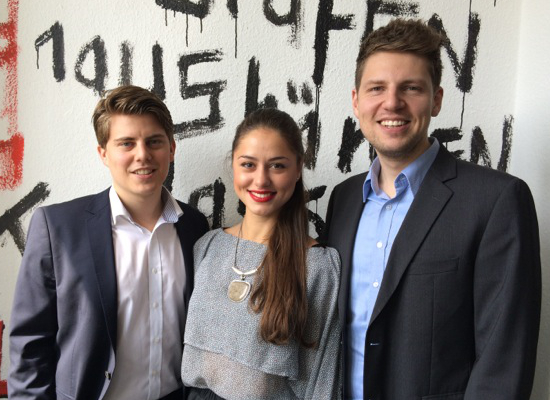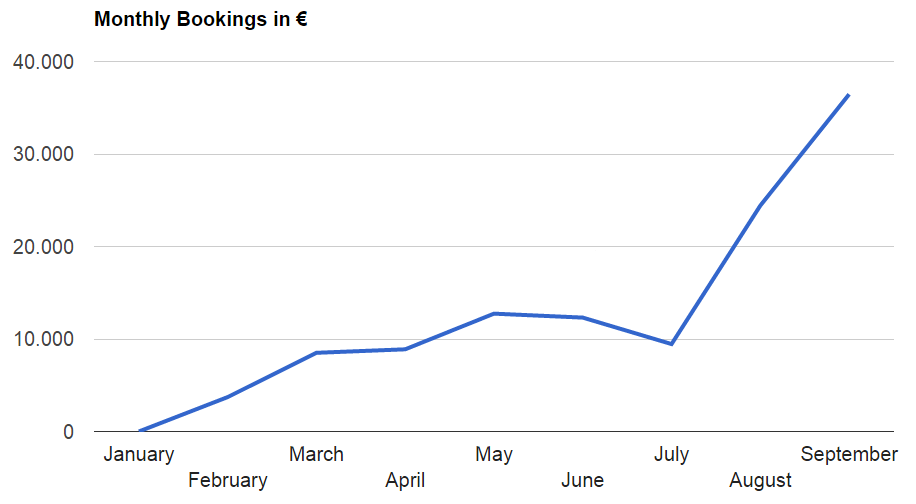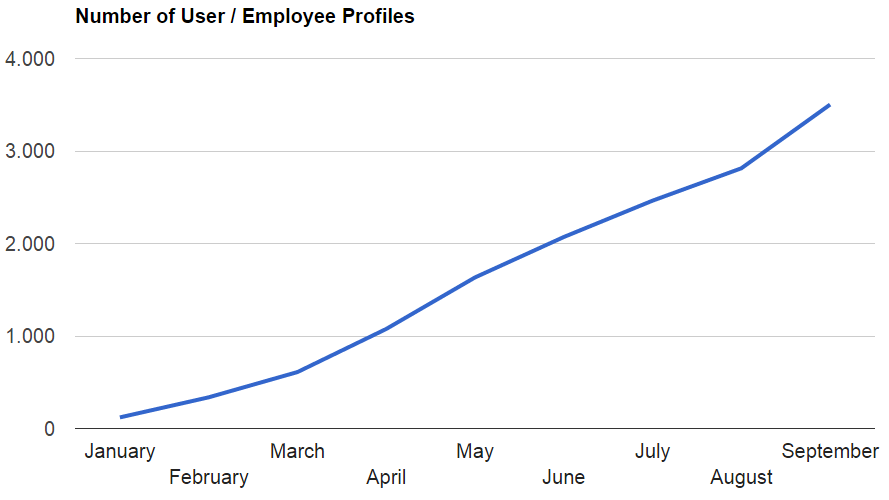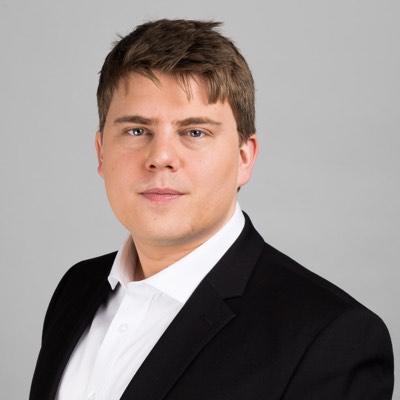
- You are here:
- Homepage
- › Startup articles
- › Break-Even Story
How our IT Startup reached Break-Even 7 months after launch
Our Staffing-as-a-Service Startup InStaff is ramen profitable. This is how we did it & what we learned!
Short Pitch: InStaff (formerly FairMaid) is an Online Marketplace for Temporary Employment, like “oDesk for Onsite Staffing”. Since our launch in February 2014 we focused on Trade Fair Hostesses and are now able to offer Event Staff all over Germany.
Who we are
Startup Team: 2 founders + 1 working student
We are two Co-Founders that studied Business Engineering at the University of Karlsruhe and in November 2013 decided to found a Startup together. My name is Pascal Klein, I have 4 years of programming experience and was responsible for Fronted Development as well as Online Marketing at my last startup Honestly. At InStaff I am the CEO/CTO, responsible for Product Development, IT and Online Marketing. My co-founder Max Kunz has the COO/CFO roles and is responsible for operations, customer support & all legal aspects. He did internships in KPMG as well as 1&1 Internet AG and organized hundreds of events when he was head of Leo Clubs Deutschland for a year. We are supported by our working student Sherin Zaian, who manages all user Support. Sherin worked for about 20 employment agencies in all of Germany as a model, hostess or stage hand.

Business Model: Online Marketplace for Temporary Employment
Businesses can book temporary staff via our platform and we charge a markup on top of the wages. First, businesses go to our website and send us a short job & event description. We then route this job to all appropriate employee profiles in our database and these employees can respond if they are interested in this job and if so, what wage they expect. The business can then compare the different employee profiles online and book the best fitting candidates. Our company InStaff takes care of the working contract, social security & payroll accounting and in return we charge a markup of 43% on top of the employees wage for our service. There are a lot of backend processes involved in terms of quality management of our employee database, job routing as well as payroll accounting. If your are interested, you can see video pitch of us.
What we have accomplished
Customer Acquisition: 39.000 € monthly revenue in 7 months
We started to develop a basic prototype as well as a Marketing Website in November 2013. In January 2014 we began to use Google Adwords to acquire potential customers and in February 2014 we officially launched our service. We made about 2.100 € of gross revenue in our first month, half of that coming from a company we knew before. Since then we grew our revenue via SEO & SEM about 30 % per month, so that in September 2014 we reached 39.100 € of gross revenue. A downturn hit us in July, because there are less exhibitions / events in the summer and another downturn might hit us december. We have a take-rate of 30 %, so our net revenue in September was about 11.500 €, which makes us about ramen profitable. (The graph to the right shows the monthly bookings which is not 100% equal to the accounted revenue, but very close.)

User Acquisition: 3.500 Employee Profiles in 9 months
To acquire potential employee profiles we also relied on SEO and SEM. It costs us about 3 to 5 € per employee profile. It is more expensive in southern German cities such as Stuttgart and Munich, because of the overall better wages and job opportunities people have there. We tried Facebook Ads and had similar user acquisition cost, but the overall quality of user profiles was bad. Apparently, it is a different story if someone explicitly searches something on Google or if someone just sees your Facebook banner. We stopped most of our payed user acquisition campaigns at the end of June, therefore our user acquisition growth slowed down. Right now we just do some campaigns in southern cities, when we receive a lot of customer requests there.

Who / what helps us on our way
Every founding team has different circumstances and learnings are not necessarily transferable. That’s why I am giving you a heads up on what, in our opinion, had the biggest impact on our early success.
Small Seed Funding
We were able to invest 25.000 € on our own, because I made a little bit of money with my last startup Honestly. In addition we received a 25.000 € funding from Axel Sprigner Plug & Play Incubator in April 2014. These 50.000 € don't sound like much, but we payed ourselves only very small wages and were therefore able to work full-time on our startup. I have huge amounts of respect for people who completely bootstrap their startup on the side while paying their bills with another job. But this had meant a huge distraction for us and we wouldn't have been able to give the amount of customer support that was probably necessary in the beginning.
Transactional Business Model
Every time a business books event or exhibition staff via our platform we charge a 43% markup on top of the employees wage (equivalent to a 30 % take rate of the final booking amount). If in contrast you are executing a classical SaaS business model with monthly fees, you have to execute against the long, slow SaaS ramp of death. Obviously classical SaaS business models can be great ideas, but it is probably a little harder with these to make money right from the start.
All skills inhouse
Our 2-person founding team had all the necessary skills to execute our business model in terms of online-marketing, programming and operational expertise. Apart from a lawyer and a tax advisor we never needed outside help. This was huge in terms of our cost structure but also for reducing the overall complexity of our startup. We might have benefited from a great designer, but because of the additional overhead it would have probably not been worth it.
Competitive Landscape
Before we started our business, we did some research about the competitive landscape and talked to stage hands and trade fair hostesses that worked for different employment agencies. It was immediately obvious to us that all competitors not only had a dated business model but also additional shortcomings: bad landing pages, spammy SEO efforts, no automized internal processes, etc. While in the longterm our technology and our business model will differentiate us from our competitors, especially in the short term these short comings of our competitors helped us a lot to enter the market. If you happen to be in a market with just a couple of big and highly efficient competitors, it will probably be way harder to enter the market with a new product / business model.
A lot of hard work
We worked a lot, especially my co-founder. By a lot I mean being in the office everyday from 8 am to about 10 pm, talking to users & customers nonstop & using the weekend to follow up on invoices. Especially in the beginning our platform was not very automated, so every staffing process involved a lot of emails and phone calls. We basically had the deal that my co-founder handled all the customer support, user support and legal overhead, so that I could focus on product development and Online Marketing without being distracted by daily operation. I honestly don't know how we would have handled it if one of us had family or other personal obligations that are time consuming.

In April 2014 we got accepted into the 3rd batch of the Axel Springer Plug & Play Accelerator. ASPnP was founded by the biggest European Media Company Axel Springer and the Sillicon Valley based Accelerator Plug & Play. It is based in Berlin and invests every three months 25.000 € in about 10 startups and supports these with mentoring and network in return for 5 % equity.

The Center for Innovation & Entrepreneurship connects founders at the University City of Karlsruhe to each other. We met great like minded people and received a lot of free mentoring in the subjects of SEO, SEM and Enterprise Sales.
Right from the beginning we had very high customer satisfaction, see our eKomi Profile. With very few exceptions all your customers said they would book again via our platform. We believe this strongly correlates with a competitive landscape that mostly consists of small and locally operating agencies, that do not have good internal processes.
What other founders can learn from us
Customer Satisfaction is the Nr. 1 KPI
We launched 7 months ago and already make about 30 % of our revenue from repeating customers. The majority were very happy with our service, which you can see by looking at our customer reviews. These repeating customers help us grow our revenue and prove to us, that we are on the right track with our service. This give us confidence and help to keep our team spirit up, even if some other things go wrong (and things go always wrong in a startup).
Focus, Focus, Focus
Temporary Employment offers huge opportunities in all kinds of sectors like retail, healthcare, manufacturing, etc.. We however focused exclusively on event staff and within this sector we are focus on the acquisition channels Search Engine Optimization & Search Engine Marketing. For every startup there are many ideas out there, that might sound like a great business opportunity, but can be huge distractions. So every entrepreneur should keep this quote from Steve Jobs in mind: “Focus is about saying No!”.
Investors are a huge distraction
I see many founders that pretty much stop working on their product as soon as they start fundraising. Fundraising can take so many resources that Paul Graham rightly said “the process of raising money itself can kill you”. There is probably a big bias in the startup community because most startup PR is mainly focused on the size and participating investors of funding rounds, instead of the milestones they have reached. We decided early on to only focus a minimum amount of time on investors. We might have been able to close another financing round if we have spent more time on investors, but on the other we would not have reached the amount of traction we have so far.
A lot of minor improvements add up
Don't treat upcoming partnerships, a big PR campaign or another feature launch as a silver bullet that will make or break your business model. I am not a fan of these silver bullets, instead I believe that a lot of minor improvements add up. These minor improvements can be another content marketing article, optimization of your adwords campaign, a design tweek to your onboarding process, better lifecycle emails and so on.
Don’t give discounts
I see many startups that rely heavily on discounts to sell their product early on. Of course there might be many circumstances where this is useful, but overall I believe this is a huge problem. Discounts not only cost you money (because the customer might have bought without discounts), but they also increase the overhead of your sale process a lot. We decided early on to always charge 43% on top of the employees wage, no matter how big or price sensitive the customer seems to be. We might have lost a couple of customers this way, but since very price sensitive customers usually also require a lot of support, this was probably the right decision in the longterm.
SEO is a great longterm marketing channel
Right from the beginning we invested a lot of time in content marketing, website speed, clean URLs, an easy navigatable website, etc.. So overall we tried to give a great user experience and always had SEO aspects in mind. Good white-hat SEO techniques take at least a couple weeks, usually months, to kick in. But in the longterm it is a great investment, especially for B2B oriented business models that have no inherent virality. And because these techniques also help your Adwords quality factor, they also directly lower your Adwords marketing cost.
About InStaff
InStaff is an Online Marketplace for Temporary Employment, like “oDesk for Onsite Staffing”. We use software technology & an online marketplace approach to lower the transaction cost of temporary staffing and offer our business customers a better & cheaper staffing process then employment agencies.
Since our launch in February 2014 we focused on exhibition staff in Germany and are now able to deliver trade fair hostesses & event staff all over Germany. If you ever happen to organize a booth or event in Germany, you can trust in our service to book good event staff at a fair price.
If you live in Germany and are interested in working as a stage hand or trade fair hostess, than just signup to get jobs. You can expect to earn 10 € to 18 € per hour, depending on your level of experience and your flexibility in terms of your working schedule.

Pascal Klein
CEO / @ InStaff
Please contact me and give me feedback to my article or our product any time.